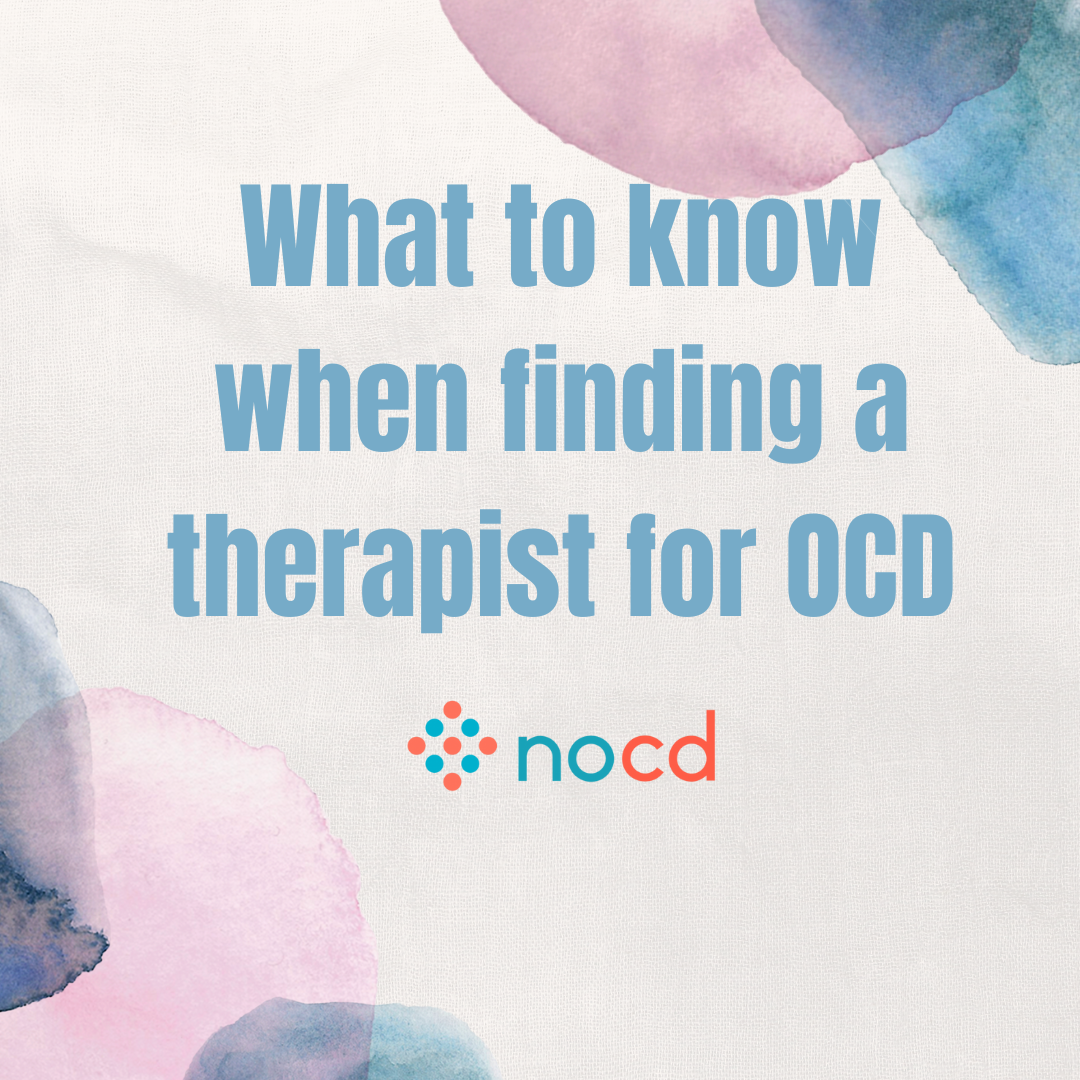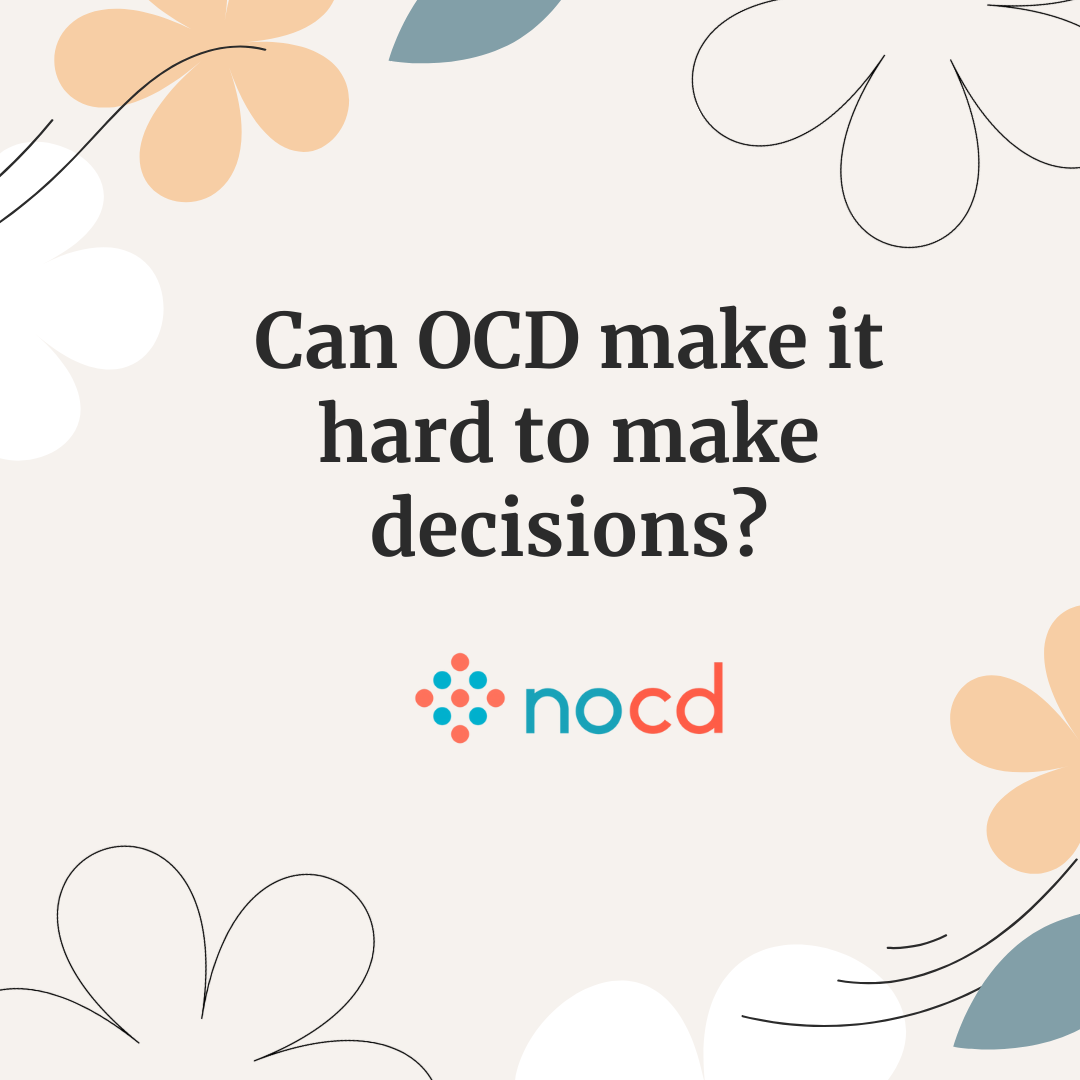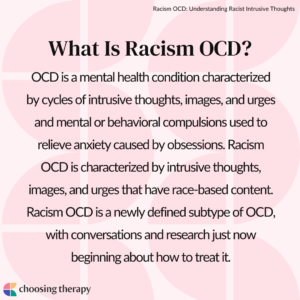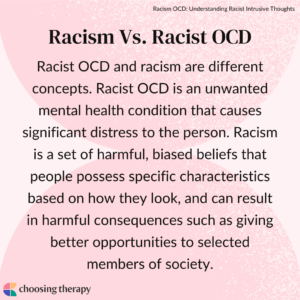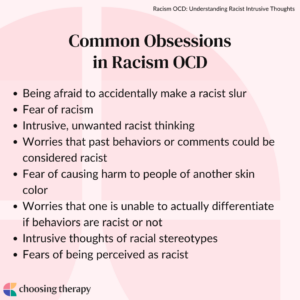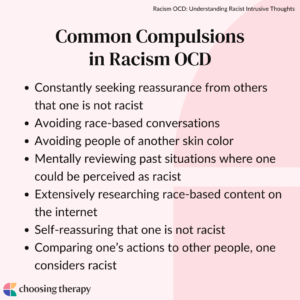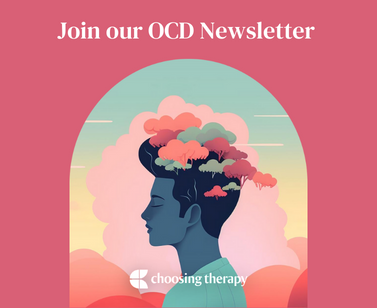Racism OCD involves race-based obsessions like fear of being a racist or accidentally using racist behaviors. Racism OCD is differentiated from racism itself by intense shame and disgust around racist intrusive thinking. OCD attacks a person’s core values, so if being antiracist is important to them, they may be at higher risk of racism OCD.
What is the best therapy for OCD? Exposure And Response Prevention Therapy (ERP) – Do live video sessions with a therapist specialized in ERP, the gold standard treatment for OCD. Treatment from NOCD is covered by many insurance plans. Start With A Free 15 Minute Call
What Is Racism OCD?
Obsessive-compulsive disorder (OCD) is a mental health condition characterized by cycles of intrusive thoughts, images, and urges and mental or behavioral compulsions used to relieve anxiety caused by obsessions. Racism OCD is characterized by intrusive thoughts, images, and urges that have race-based content. Racism OCD is a newly defined subtype of OCD, with conversations and research just now beginning about how to treat it.
OCD tends to attack a person’s core values; therefore, racism OCD may be more common in individuals who are conscientious about race-based issues. Because racism OCD is a sensitive topic, individuals might not seek help for struggles with these obsessions, and so there are no concrete numbers on the prevalence of racism OCD.2
Racism Vs. Racist OCD
Racist OCD and racism are different concepts. Racist OCD is an unwanted mental health condition that causes significant distress to the person. Racism is a set of harmful, biased beliefs that people possess certain characteristics based on how they look, and can result in harmful consequences such as giving better opportunities to selected members of society.2
You can differentiate Racist OCD from racism based on whether someone holds racist beliefs (even subconsciously) or is anxious about the possibility of having intrusive racist thoughts. Someone who is discriminatory generally shows pride related to their racist thoughts, whereas someone who experiences racism OCD feels ashamed or disgusted by the content of their racist obsessions.
Symptoms of Racism OCD
General symptoms of OCD include unrelenting OCD cycles of intrusive thoughts and compulsions aimed at reducing the distress of obsessions. Symptoms of the subtype racism OCD include intense fears of racism or race-based triggers, compulsions like obsessively seeking reassurance that one is not racist, or even unwanted intrusive thoughts of racial stereotypes.
One compulsion commonly used is avoidance behaviors, such as avoiding race-based conversations or engaging with people of a different skin color. Racism OCD sufferers commonly use the avoidance coping mechanism because they fear any trigger to their distressing racist intrusive thoughts.
Common obsessions in racism OCD include:
- Being afraid to accidentally make a racist slur
- Fear of racism
- Intrusive, unwanted racist thinking
- Worries that past behaviors or comments could be considered racist
- Fear of causing harm to people of another skin color
- Worries that one is unable to actually differentiate if behaviors are racist or not
- Intrusive thoughts of racial stereotypes
- Fears of being perceived as racist
Common compulsions in racism OCD include:
- Constantly seeking reassurance from others that one is not racist
- Avoiding race-based conversations
- Avoiding people of another skin color
- Mentally reviewing past situations where one could be perceived as racist
- Extensively researching race-based content on the internet
- Self-reassuring that one is not racist
- Comparing one’s actions to other people, one considers racist
What Triggers Racism OCD?
Since conversations on antiracism have become more common, the incidences of racism OCD may rise. For someone with racism OCD, obsessions may latch onto any inclination to stereotypes. Some research also indicates that experiences of discrimination, or witnessing these experiences in others, can contribute to developing racism OCD.
Common triggers for racism OCD include:
- Media exposure via the news, movies, or social media depicting discrimination or stereotypes
- Race-based conversations at school, work, or in personal life
- Valuing antiracism (since OCD attacks core values)
- Past experiences of discrimination or witnessing discrimination of others
- High-stress levels coupled with any of these other triggers
How much do you know about OCD? Take This 11-Question OCD Quiz From NOCD. If you or a loved one are struggling with OCD, NOCD provides convenient, affordable, and effective OCD treatment covered by most major insurance plans.
Causes of Racism OCD
Research is lacking into the specific causes of the racism OCD subtype, but there is a lot of research on the causes of general OCD. OCD genetic factors include having a family history of the disorder.1
For racism OCD in particular, having family members who have either witnessed experiences of discrimination or experienced discrimination themselves may pose a risk. Especially if one’s family values antiracist beliefs, this could cause OCD obsessions to latch onto race-based content.
Impacts of Racism OCD
Living with racism OCD can cause OCD-induced guilt from feelings of shame related to race-based obsessions. Someone with racism OCD likely experiences strains on their sense of identity, as they feel stuck in a cycle of proving to themself that they aren’t racist. Racism OCD can also affect a person’s relationships as they seek constant reassurance from others.
How Is Racism OCD Diagnosed?
The OCD diagnosis process typically involves a mental health professional like a therapist, psychiatrist, or medical doctor. Your provider may ask you to make an appointment with your doctor to rule out any health conditions that could mimic symptoms of OCD. Your therapist or psychiatrist will conduct a clinical interview to determine if an OCD diagnosis is appropriate.
If you feel you identify with the subtype of racism OCD, you can mention it to your therapist, psychiatrist, or doctor. Although the DSM-5 does not specify subtypes of OCD, mentioning racism OCD can help your provider understand the context of your symptoms and make a plan for treatment. Some providers may also use the Yale-Brown Obsessive Compulsive Scale to assess the frequency and severity of OCD symptoms.
Questions to ask your doctor about racism OCD include:
- Where can I find specialized racism OCD treatment?
- What does a typical treatment plan look like?
- Are there certain therapies that could help with racism OCD?
- Are there any support groups you might recommend for my symptoms?
Treatment for Racism OCD
Exposure and response prevention (ERP) is the gold standard therapy recommended for racism OCD treatment.1 A comprehensive treatment plan typically involves medication, therapy, or a combination of both approaches.1
ERP is the most recommended approach because it universally targets the cyclical nature of obsessions and compulsions by slowly exposing a person to their worst fears and then preventing the use of compulsions.1 ERP tends to show improvements in short amounts of sessions because of the aggressive nature of treatment.
Treatment For OCD NOCD: Online OCD Treatment Covered By Insurance – Regain your life from OCD. Do live video sessions with a licensed therapist specialized in treating OCD. Treatment from NOCD is covered by most major insurance plans. Learn how you can use your insurance benefits. Visit NOCD Talkiatry: Is OCD Medication Right For You? Speak with A Doctor – Talkiatry can match you with a psychiatrist who takes your insurance and is accepting new patients. They’re in-network with major insurers and offer medication management with supportive therapy. Free Assessment
Treatment for racism OCD involves:
Therapy for Racist OCD
Most people hope that therapy will help them learn how to stop racist thoughts. Although the thoughts themselves are distressing, it is actually attaching meaning to the thoughts that cause distress. Therapy for Race OCD involves accepting intrusive thoughts will not stop, but you can learn strategies to live life despite them.
Some approaches to therapy for Race OCD help expose you to obsessions, while others might help you challenge the content of obsessions. Other therapies might focus on racial trauma experiences behind Race OCD or strengthening relationships for interracial couples where one person has Race OCD.
Effective therapy options for racism OCD include:
- Exposure and response prevention (ERP): Exposure and response prevention is the gold standard approach for all subtypes of OCD. Through ERP, someone with Race OCD learns strategies to expose themselves to obsessions without using compulsions to self-soothe.
- Cognitive behavioral therapy (CBT): CBT for OCD helps someone learn about the connection between thoughts, emotions, and behavior. Someone with Race OCD might explore how their negative thinking patterns around race may cause obsessions, which trigger the urge for compulsions.
- Acceptance and commitment therapy (ACT): ACT for OCD teaches psychological flexibility through noticing thoughts, avoiding attaching meaning, and choosing to move forward with life choices that reflect your core values. Someone with Race OCD might accept that racist intrusive thoughts are not a reflection of being a racist and commit to life choices that reflect antiracism values.
- Racial-trauma therapy: Experiences of racism sometimes cause BIPOC to develop race-based traumatic stress, which might be a comorbid diagnosis with Race OCD. Especially for BIPOC who develop a phobia of white people, racial trauma can be targeted through trauma-informed interventions or therapies.
- Couples therapy: Couples therapy may be indicated for interracial couples where one person experiences Race OCD. Since race-based obsessions can affect the quality of the relationship, a couples therapist can help strengthen intimacy and communication, while individual therapy targets the nature of intrusive racist thoughts.
Medication for Racist OCD
Medications in managing OCD can be used in the treatment of racist OCD. Medications are generally prescribed in combination with therapy. Selective serotonin reuptake inhibitors (SSRIs) are the standard treatment approach for managing OCD, but sometimes benzodiazepines and antipsychotics may also be used.1
How to Cope With Racism OCD
Coping with racism OCD includes identifying OCD triggers, sometimes through the use of online resources and technology. Learning about antiracism can also be a part of psychoeducation if you find a therapist who is knowledgeable about systemic racism and ways to challenge it.
Healthy coping mechanisms like practicing mindfulness and engaging in exposures can help directly cope with the nature of obsessions, while utilizing grounding techniques can support those who have comorbid racism OCD and race-based trauma.
Here are eight tips for coping with racism OCD:
1. Practice Mindfulness & Acceptance
Mindfulness techniques can help you notice and observe racist intrusive obsessions without attaching meaning, kind of like watching them as clouds floating by in the sky. You can practice mindfulness strategies with more neutral thoughts first and then use the same strategies on your racist intrusive thinking.
Meditation techniques for OCD are mindfulness strategies that help reduce stress and accept the nature of thought patterns. For example, a loving-kindness meditation may help increase compassionate thoughts for yourself and those who are the content of your obsessions. Through meditation, you can expose yourself to your obsessions in a more neutral environment.
2. Identify Your Triggers
For BIPOC who struggle with racism OCD, it can be helpful to differentiate between racial trauma thoughts and race-intrusive obsessions. BIPOC sometimes face daily discrimination, which forces them to develop certain survival strategies around white people. Knowing what survival strategies one has developed in the face of racism can help you pick apart and process triggers for OCD race thoughts.
All people have implicit biases around race and other societal constructs like gender and age. Learning the history behind these biases can help you understand and target your own triggers for racism OCD thoughts. For example, some intrusive thoughts can be connected to your own implicit biases about certain people. Examining why you have these stereotypes can help expose you to the nature behind obsessions.
3. Limit Reassurance-Seeking Behaviors
Individuals with OCD often use OCD reassurance-seeking behaviors to seek short-term validation and relief from obsessions. Reassurance-seeking includes asking someone if your behaviors seem racist or to assure you that you are not racist. In the short term, these behaviors give someone relief from obsessions, but in the long term, they reinforce the cycle of obsessions and compulsions.
By avoiding reassurance-seeking, someone with Race OCD can reinforce that their obsessions do not have meaning attached. They can learn to tolerate the distress of racial intrusive thinking without engaging in compulsions, strengthening this as a pathway for future behaviors.
4. Utilize Online Resources & Technology
Online OCD resources can help you explore which strategies feel most appropriate for your racism OCD. Understanding the pros and cons, costs, and reviews of mental health apps and resources such as NOCD can help you differentiate what resources feel the best for your specific lifestyle. For example, some people may find relief in hearing stories of racist intrusive obsessions through blogs or podcasts. For others, this may reinforce obsessions or cause rumination urges.
What is the best therapy for OCD? Exposure And Response Prevention Therapy (ERP) – Do live video sessions with a therapist specialized in ERP, the gold standard treatment for OCD. Treatment from NOCD is covered by many insurance plans. Start With A Free 15 Minute Call
5. Learn about Anti-Racism
Anti-racism ideology teaches we all have implicit racist thoughts due to the society we live in. Accepting that everyone has racist thoughts, they are responsible for challenging is likely at the center of exposure for therapy. Learning about anti-racism can be a powerful experience for anyone because it can empower you to have conversations about race and challenge racist behaviors and attitudes, which may be at the center of obsessions.
6. Use Sticky Notes to Expose Yourself to Obsessions
ERP therapists often use sticky notes to help clients expose themselves to obsessions in a controlled manner. Sticky notes are notes with some form of recurrent obsession. This strategy is done under the guidance of an ERP therapist, where you can slowly build up to more distressing content on the sticky notes. Sticky notes support habituation to obsessions, where eventually, the thoughts lose their meaning.
Possible sticky note content for racism OCD includes:
- Maybe people think I am a racist.
- I have racist thoughts.
- So what if I obsess about race all day?
- Maybe I will have racist thoughts forever.
- Maybe I have used racist behavior in the past.
7. Use Race-Based Documentaries as Imaginal Exposures
Since racism is a real and justified fear of BIPOC and anyone with racism OCD should not purposefully utilize racist behaviors, imaginal exposures through race-based documentaries are less harmful strategies for confronting obsessions. For example, someone could watch a documentary centered on the history of people who are involved in obsessions. They would utilize prevention of compulsions during this exposure. This intervention is best completed under the guidance of a therapist.
8. Use Grounding Techniques
For BIPOC with comorbid racism OCD and racial trauma, grounding techniques can be helpful trauma-based intervention. Grounding techniques are strategies to avoid dissociation and stay in the present moment. Grounding techniques include breathing strategies and mindful sensory-based techniques. For example, utilizing a body scan during conversations around race can help you learn which body parts carry the most anxiety when you are triggered.
Overcoming the Stigma of Racism OCD
Racism OCD can be a confusing and shameful experience. There can be a stigma against those with racist intrusive thoughts because some people don’t understand the difference between racism OCD and racism itself. If you have racism OCD, it is important to educate yourself and others so that awareness can help foster understanding and support for those affected.
Strategies to overcome stigma include educating yourself and others about racism OCD, learning and using antiracist behaviors to help differentiate from obsessions, and utilizing blogs as resources to read about and connect with others who have racism OCD. Building a support network that understands your struggles can help empower you to educate those who are ignorant about race-based obsessions.
When to Seek Professional Support for Racism OCD
If Racism OCD is causing daily racist intrusive thinking that is affecting your ability to focus and follow through with personal and professional responsibilities, it may be time to seek professional help. Especially if suicidal ideation or thoughts of death are frequent, letting your support system know what is happening and seeking treatment are recommended steps to avoid worsening of symptoms.
An online therapist directory or online therapy platform can assist you in finding a therapist who is familiar with the obsessive-compulsive cycle and racist intrusive thoughts. Online psychiatrist options can provide support in the form of medication management, which may provide some relief from biological imbalances.
Help for OCD Virtual psychiatry – Get OCD help from a real doctor who takes your insurance. Talkiatry offers medication management and online visits with expert psychiatrists. Take the online assessment and have your first appointment in days.
How to Help a Loved One With Racist OCD
Individuals with racism OCD tend to engage in asking for reassurance that they are not racist, but giving in to this request will only reinforce their obsession in the long run. Instead, remind them that they have the coping skills to face their obsession. You can offer to sit with them while they practice reducing anxiety without engaging in compulsions, as this offers support without enforcing the obsession.
Here are some tips to support a loved one struggling with racist OCD:
- Educate yourself about OCD: Educating yourself on the signs, symptoms, and coping strategies for OCD can help you feel empowered to help your loved one. You can be involved in your loved one’s treatment by refusing to participate in compulsions and encouraging adaptive coping skills.
- Educate yourself on antiracism: Antiracism is the practice of utilizing daily and personalized behaviors to combat systemic racism. By understanding the ways you can be a part of dismantling systemic racism, you can feel more empowered to face the content and roots of your loved one’s intrusive racist thinking.
- Avoid engaging in reassurance: A common compulsion for Racism OCD is to ask for reassurance from a loved one. By refusing to engage in this compulsion, you give your loved one the opportunity to learn to tolerate the distress and disengage from obsessive-compulsive cycles.
- Avoid shaming during slip-ups: Slip-ups are common during treatment. Your loved one will have hard days and sometimes use old compulsions. During these days, it is important not to shame them and instead support them by encouraging the use of positive coping mechanisms instead.
- Encourage them to engage in exposures: Exposures are hard and scary for someone with OCD; however, they are the most evidence-based way to challenge the obsessive-compulsive cycle. Encouraging your loved one to confront their fears will help them feel supported in learning new strategies to tolerate distress.
In My Experience
To help our readers take the next step in their mental health journey, Choosing Therapy has partnered with leaders in mental health and wellness. Choosing Therapy is compensated for marketing by the companies included below. OCD Therapy NOCD: Effective, Affordable, & Convenient OCD Therapy Do live, face-to-face video sessions with a therapist who specializes in treating OCD and get 24/7 support between sessions. NOCD is covered by many insurance plans and is available nationwide. Visit NOCD Treatment From An Online Psychiatrist Talkiatry OCD is treatable. Talkiatry specializes in OCD and provides personalized care with medication and additional support. Get started with a short assessment. OCD Community - Free To Join! Join others who are overcoming OCD. Participate anonymously. Find support, connect, and overcome challenges with us. The community is managed by NOCD. Join The Community OCD Newsletter A free newsletter from Choosing Therapy for those impacted by OCD. Get helpful tips and the latest information. Sign-UpAdditional Resources
What to know when finding a therapist for OCD With so much information out there regarding providers and treatment options for obsessive compulsive disorder, it can be hard to know exactly where to start—especially when you have to consider everything from the type of provider to the different treatment methods, as well as how you’ll fit it into your busy schedule. Can OCD make it hard to make decisions? From choosing what to wear in the morning to picking what to eat for dinner, decision-making is a part of everyone’s daily routine. But for millions of people with Obsessive-Compulsive Disorder (OCD), making any choice can feel like a daunting, sometimes impossible task.